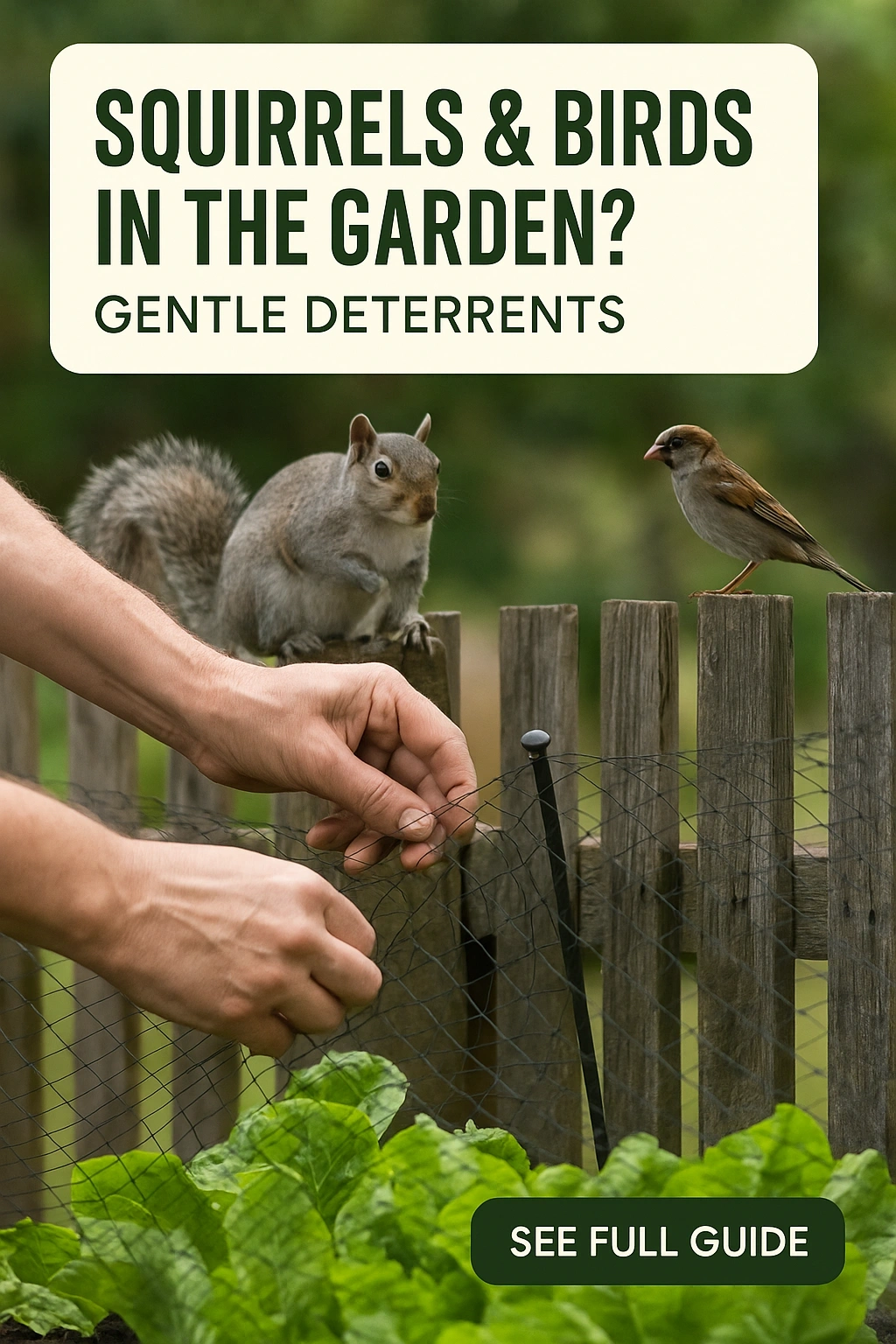
Gardening can be a rewarding experience, but it often comes with challenges, especially when it comes to managing wildlife. Squirrels and birds can be delightful to observe, yet their presence may sometimes lead to conflicts over garden space and resources. Understanding these creatures, their behaviors, and employing gentle deterrents can help maintain a harmonious garden environment. This article provides practical solutions for gardeners seeking to coexist peacefully with squirrels and birds.
The Role of Squirrels and Birds in Your Garden
Squirrels and birds are integral parts of the garden ecosystem. Squirrels assist in seed dispersal, which can help plants grow in new areas. Birds, on the other hand, play a crucial role in pest control, consuming insects that can harm your plants. However, their presence can also lead to some challenges, such as the consumption of fruits, vegetables, and birdseed, which can frustrate gardeners.
Identifying Common Challenges
Before implementing deterrents, it is essential to identify the specific issues caused by squirrels and birds in your garden. Understanding their behaviors can help you choose the most effective strategies to mitigate their impact while preserving the wildlife benefits they offer.
Common Problems Caused by Squirrels
- Seed Theft: Squirrels are notorious for raiding bird feeders and seed caches.
- Garden Damage: They may dig up bulbs or eat seedlings, stunting plant growth.
- Nesting: Squirrels can nest in trees or structures, potentially leading to damage.
Common Problems Caused by Birds
- Fruit and Vegetable Consumption: Birds often peck at ripe fruits and vegetables, leading to loss.
- Seed Displacement: Birds can scatter seeds, disrupting planned garden layouts.
- Pest Attraction: Some species may attract pests that harm plants.
Gentle Deterrents for Squirrels
While it may be tempting to use harsh methods to deter squirrels, gentle approaches are more effective and ethical. These methods allow for coexistence while minimizing the disruption to your garden.
Physical Barriers
One of the most effective deterrents is the use of physical barriers. These can prevent squirrels from accessing the areas where they cause the most damage.
- Netting: Use bird netting over seedlings and young plants to protect them from being dug up.
- Fencing: Install fences around garden beds, ensuring they are tall enough and buried deep enough to deter digging.
Feeding Alternatives
Providing alternative food sources can help distract squirrels from your garden. Placing squirrel feeders away from your main garden can keep them occupied.
- Specialized Feeders: Use feeders that are specifically designed for squirrels, filled with their preferred foods like nuts and corn.
- Location: Position these feeders away from your garden to draw squirrels away from your plants.
Gentle Deterrents for Birds
Birds can be beautiful additions to your garden, but their feeding habits can be problematic. Implementing gentle deterrents will help protect your plants while still allowing you to enjoy their presence.
Visual Deterrents
Visual deterrents can effectively scare birds away from certain areas without causing harm. These methods can be both creative and effective.
- Reflective Objects: Hang reflective tape, old CDs, or aluminum foil around your garden. The light reflection can startle birds.
- Decoys: Use predator decoys, such as plastic owls or hawks, to create an illusion of danger.
Feeding Strategies
Adjusting your feeding strategies can help manage bird populations while still providing for them in a controlled manner.
- Feeder Placement: Place bird feeders away from your fruit and vegetable plants to limit access.
- Seed Selection: Opt for birdseed that is less appealing to the species that cause the most trouble.
Creating a Balanced Ecosystem
While it is essential to manage the populations of squirrels and birds, fostering a balanced ecosystem can also be beneficial. Encouraging beneficial insects and plants can help create a more resilient garden.
Encouraging Beneficial Wildlife
By cultivating a diverse range of plants and attracting beneficial insects, you can enhance the overall health of your garden. This approach can help reduce reliance on deterrents.
- Native Plants: Incorporate native plants that attract pollinators and beneficial insects.
- Companion Planting: Utilize companion planting techniques to deter pests naturally, reducing the need for deterrents against birds.
FAQs
How can I stop squirrels from eating my birdseed?
To prevent squirrels from accessing birdseed, consider using squirrel-proof bird feeders that are designed to keep them out. Additionally, you can place feeders on poles with baffles that prevent squirrels from climbing up.
What are the best plants to deter squirrels?
Certain plants can deter squirrels due to their strong scents or tastes. Plants like daffodils, marigolds, and herbs such as rosemary and sage can be effective in keeping squirrels at bay.
Are there any safe repellents for birds?
Safe repellents for birds include using non-toxic sprays made from essential oils or creating homemade solutions with ingredients that birds find unappealing, like cayenne pepper mixed with water.
Can I attract more birds while deterring them from my garden?
Yes, you can create designated areas for bird feeders away from your garden while planting native flowers and shrubs that attract them. This way, you can enjoy their presence without compromising your plants.
How do I identify which birds are causing trouble in my garden?
To identify troublesome birds, observe their feeding habits and the times they visit your garden. Keeping a garden journal can help you track which species are causing the most issues.
